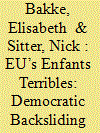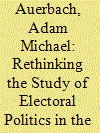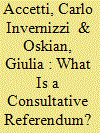|
|
|
Sort Order |
|
|
|
Items / Page
|
|
|
|
|
|
|
| Srl | Item |
| 1 |
ID:
184252


|
|
|
|
|
| Summary/Abstract |
Our understanding of modern authoritarianism lacks a satisfying explanation for the genuine popularity of autocrats. While most of the literature on authoritarianism focuses on coercion, institutional manipulation, or clientelism, many contemporary autocrats clearly enjoy enthusiastic support even in times of economic stagnation or decline. We argue that part of the solution lies in unpacking the role of emotions in building support for rulers. Drawing on a unique panel survey conducted shortly before and after Russia’s annexation of Crimea, we discover that the resulting “rally” around the authoritarian flag involves much more than simply support for the leader or a simple increase in nationalism. Rather, we witness a broad shift in respondents’ emotional orientation. Driven by the shared experience of the Crimean “moment,” this shift improves people’s evaluation of their social, political, and economic surroundings in the present, the future—and even the past. The result is a new explanation of the nonmaterial means through which autocrats may succeed in bolstering their legitimacy.
|
|
|
|
|
|
|
|
|
|
|
|
|
|
|
|
| 2 |
ID:
184266


|
|
|
|
|
| Summary/Abstract |
During the past two decades, there have been growing calls for broadening the discipline of international relations (IR) by giving due recognition to the history, culture, ideas, and agency of non-Western states and societies. Several aspects of this trend are noteworthy. First, it originated from the growing dissatisfaction by non-Western scholars with the Western (US and European) dominance of the IR field, a dominance that obscures and marginalizes the past and recent contributions of other societies. As such, the primary voices challenging this dominance have been non-Western scholars, sometimes in collaboration with a few Western counterparts. These include not just scholars of postcolonialism and race, but also some working in the English School and constructivist and non-Western/post-Western traditions.
|
|
|
|
|
|
|
|
|
|
|
|
|
|
|
|
| 3 |
ID:
184250


|
|
|
|
|
| Summary/Abstract |
Engaged pluralism entails active interaction, debate, and learning from each other. I argue that individuals need to undertake the challenges arising from engaged pluralism to ensure a healthy, vibrant disciplinary future, and for a democracy that thrives. I consciously extend the term “engagement” to apply not only to understanding across sub-disciplines and different grounds of knowledge, but also to addressing research to the needs of society. There are golden opportunities centered around the benefits of a more open, rigorous, and contentious science that can be maximized through focused engagement around methodologies and methods. In short, two primary themes encapsulate my views on where our discipline should be heading. First, the pursuit of engaged methodological pluralism in our scholarship is critical. Second, supporting democratic principles and civic engagement, which is at the core of the American Political Science Association and has continued, in ebbs and flows, throughout the discipline’s life, is necessary.
|
|
|
|
|
|
|
|
|
|
|
|
|
|
|
|
| 4 |
ID:
184251


|
|
|
|
|
| Summary/Abstract |
In the academic literature, Hungary and Poland are often cited as paradigmatic cases of democratic backsliding. However, as the backsliding narrative gained traction, the term has been applied to the rest of the post-communist region, including the Czech Republic and Slovakia. We suggest that this diagnosis is in part based on conceptual stretching, and set out to rescue the concept as an analytical tool. We then assess the extent of backsliding in the four Visegrád countries, explaining backsliding (and the relative lack of it) in terms of motive, opportunity, and the strength or weakness of opposing or constraining forces. We conclude that the situation is not as desperate as some commentators would have it: democratic backsliding in Hungary and Poland was contingent on a few exceptional factors, and EU leaders therefore need not be paralysed by the fear of contagion when they contemplate forceful action against backsliding member states.
|
|
|
|
|
|
|
|
|
|
|
|
|
|
|
|
| 5 |
ID:
184255


|
|
|
|
|
| Summary/Abstract |
In recent years, Central and Eastern Europe have furnished several examples of illiberalism in power. The most prominent and consequential cases are Fidesz, which has ruled in Hungary since 2010, and Law and Justice (PiS), which has ruled in Poland since 2015. In both cases, illiberal governments have embarked upon an extensive project of political reform aimed at dismantling the liberal-democratic order. We examine the nature, scope, and consequences of these processes of autocratisation. We first argue that illiberal changes are ideologically founded and identify how both populism and nativism figure in the policymaking of illiberals in power. We then show how these practices emerge from a common “illiberal playbook”—a paradigm of policy change comprising forms of forging, bending, and breaking—and elaborate on the notion that illiberal governments are using legalism to kill liberalism. The fine-grained approach that we employ allows us to distinguish between different rationales and gradations of illiberal policymaking, and assess their implications for the rule of law, executive power, and civil rights and freedoms
|
|
|
|
|
|
|
|
|
|
|
|
|
|
|
|
| 6 |
ID:
184259


|
|
|
|
|
| Summary/Abstract |
In this article we reassess conceptions of the welfare state with an eye towards the limits of current scholarly approaches. In particular, we propose centering the study of the welfare state around those who occupy the margins of American society. We argue that concentrating on populations at the proverbial “bottom” of standard economic and political hierarchies productively reorients research on social policy and politics by bringing crucial but often overlooked facets of the welfare state into sharper view. Specifically, the bottom-up approach we offer here entreats political scientists to re-consider where they look in their efforts to delineate the welfare state, how to examine what they find, and what kinds of questions to ask in the process. Ultimately, studying the welfare state from the bottom up suggests a host of new directions for scholars seeking to understand its politics.
|
|
|
|
|
|
|
|
|
|
|
|
|
|
|
|
| 7 |
ID:
184249


|
|
|
| 8 |
ID:
184260


|
|
|
|
|
| Summary/Abstract |
Did the COVID-19 crisis have a significant effect on Trump’s electoral demise? We present survey experimental evidence on two substantial effects of the pandemic. First, information on the unprecedented economic downturn significantly depressed Trump’s popular support across all partisan groups, and especially among middle-low and low-income respondents. Second, being primed on the poor public health record of the Trump administration reduced its electoral prospects among citizens between 55 and 70 years old. We conclude that the 2020 election was a normal contest compatible with theories of economic voting and political competence. Our results suggest that democratic accountability can be a powerful determinant of the fate of populist leaders once in power.
|
|
|
|
|
|
|
|
|
|
|
|
|
|
|
|
| 9 |
ID:
184265


|
|
|
|
|
| Summary/Abstract |
In the study of electoral politics and political behavior in the developing world, India is often considered to be an exemplar of the centrality of contingency in distributive politics, the role of ethnicity in shaping political behavior, and the organizational weakness of political parties. Whereas these axioms have some empirical basis, the massive changes in political practices, the vast variation in political patterns, and the burgeoning literature on subnational dynamics in India mean that such generalizations are not tenable. In this article, we consider research on India that compels us to rethink the contention that India neatly fits the prevailing wisdom in the comparative politics literature. Our objective is to elucidate how the many nuanced insights about Indian politics can improve our understanding of electoral behavior both across and within other countries, allowing us to question core assumptions in theories of comparative politics.
|
|
|
|
|
|
|
|
|
|
|
|
|
|
|
|
| 10 |
ID:
184256


|
|
|
|
|
| Summary/Abstract |
The West is turning inward. Donald Trump’s presidency, Britain’s decision to leave the European Union, and the spread of populist parties in Europe are the most visible signs of this retreat. The shift is not as recent as these examples suggest, however. Drawing on an array of cross-national data for twenty-four industrialized democracies and hundreds of political parties in those democracies, we show that domestic support for liberal internationalism has been receding for twenty-five years across the West. We show that since the end of the Cold War a large and widening gap has opened up between Western democracies’ international ambitions and their domestic political capacity to support them. As Western governments came to rely increasingly on economic globalization, institutionalized cooperation, and multilateral governance, mainstream parties that backed these efforts lost electoral ground to parties on the radical-left and increasingly, the anti-globalist radical-right that have been the vehicles of the current backlash. We discuss the implications of these trends for the Western liberal international order and the strategies now on offer to repair it.
|
|
|
|
|
|
|
|
|
|
|
|
|
|
|
|
| 11 |
ID:
184254


|
|
|
|
|
| Summary/Abstract |
Scholars generally assume that authoritarian regimes will not curb corruption because autocrats benefit from it politically, use anti-corruption campaigns as excuses to purge rivals, and reject democratic institutions widely thought to reduce corruption, such as judicial independence. However, I argue that authoritarian regimes curb corruption more frequently—and sometimes more effectively—than scholars realize. Using a novel scoring system for anti-corruption efforts, I find that there have been at least twenty-five substantial anti-corruption efforts and nine successful reforms by authoritarian regimes in recent decades. Despite the association between democracy and corruption control, successful reforms have been by fully authoritarian regimes, rather than hybrid regimes, and employed a decidedly authoritarian approach, rather than the conventional approach emphasizing democratic institutions. This authoritarian approach to corruption control commonly involves power centralization, top-down control and penetration, and regime propaganda. I illustrate these points with a “least likely” case study of Chinese president Xi Jinping’s controversial anti-corruption campaign. At the theoretical level, I suggest that authoritarian regimes succeed in overcoming challenges—corruption being a hard challenge—through their own institutional strengths, rather than by mimicking democracies. This points to the need to reconsider certain influential views in the study of authoritarianism.
|
|
|
|
|
|
|
|
|
|
|
|
|
|
|
|
| 12 |
ID:
184258


|
|
|
|
|
| Summary/Abstract |
We seek to answer a deceptively simple question: why do private citizens in liberal democracies offer hospitality to undocumented migrants? Through qualitative interviews with French citizens, we propose three reasons. The first is widely recognized in the scholarly literature: hospitality is offered out of a care and concern for vulnerable and precarious migrants. However, we uncover two additional reasons that are not acknowledged in studies on hospitality. One is the desire by citizens to uphold the basic principles and ideals of their own society (what we call “care for the world”). Another is the desire on the part of citizens themselves to become a different and better kind of person by practicing hospitality (what we call “care of the self”). We provide a multifaceted account of what motivates citizens to offer hospitality even in situations where it is outlawed by their own governments.
|
|
|
|
|
|
|
|
|
|
|
|
|
|
|
|
| 13 |
ID:
184264


|
|
|
|
|
| Summary/Abstract |
The past decade has witnessed a resurgence of patrimonial rule not only in the developing world but also, more surprisingly, in the developed West. This resurgence carries potentially dire consequences for responding to a range of pressing problems. Understanding the sources of contemporary patrimonialism is hindered by assimilating the phenomenon into the familiar democracy/autocracy typology or by assuming that it is a function of failed modernization. This article identifies the patrimonial phenomenon and explores the contemporary global diffusion of patrimonial rule from its origins in postcommunist Russia, with a focus on how patrimonialism has manifested itself in policy responses to the COVID-19 pandemic. Some signs indicate that reestablishing bureaucratic predictability and expertise may be much harder than demolishing it. In some respects, the task may be more daunting than the salvation of democracy itself.
|
|
|
|
|
|
|
|
|
|
|
|
|
|
|
|
| 14 |
ID:
184257


|
|
|
|
|
| Summary/Abstract |
We examine the democratic legitimacy of popular referendums asking whether they should be understood as bypassing or complementing representative institutions. To answer this question, we focus on the distinction between legislative referendums and consultative ones, noting that even though referendums of the latter kind are by far more prevalent from an empirical point of view, their specific role in democratic decision-making remains under-theorized in the existing literature. We therefore focus on consultative referendums as a possible way of reconciling the referendum procedure with representative democracy. First, we clarify the specific conception of representative democracy that underscores our study; second, we develop the idea that consultative referendums are to be understood to specify the political mandate of elected representatives; finally, we apply the results of this conceptual work to the case of the Greek bailout and the Brexit referendums, aiming to dispel some lingering misconceptions concerning the normative implications of their results and thereby clarifying the normative significance of our theory.
|
|
|
|
|
|
|
|
|
|
|
|
|
|
|
|
| 15 |
ID:
184262


|
|
|
|
|
| Summary/Abstract |
In recent decades, prominent national leaders like Turkey’s Recep Tayyip Erdoğan and Venezuela’s Hugo Chávez gained power through democratic institutions, only to undermine those institutions once in office as part of a broader effort to consolidate authoritarian power. Yet attempts at “executive aggrandizement” have failed in other countries, with varying consequences for democratic institutions. We develop an agency-based perspective to enhance the understanding of aggrandizement and to explain when it results in democratic breakdown. Relying on comparative case studies of five countries—Bolivia, Ecuador, Thailand, Turkey, and Venezuela—our analysis suggests that the contingent decisions of opposition actors during the process of aggrandizement have a significant effect on regime outcomes. Irregular opposition attempts to remove incumbents from office, which are especially likely after electoral defeats, contribute to democratic breakdown. More moderate responses to aggrandizement, on the other hand, help the opposition actors to buy time until the next election, hence offering the possibility for democratic survival.
|
|
|
|
|
|
|
|
|
|
|
|
|
|
|
|
| 16 |
ID:
184253


|
|
|
|
|
| Summary/Abstract |
Under what conditions do nation-wide mass protests in authoritarian regimes produce new local activist organizations? Based on sixty-five interviews and over 1,000 media reports, internal documents, and social media posts, I compare the organization-building process in the “For Fair Elections” (FFE) protests of 2011–2012 across four Russian regions. I argue that mass protests are more likely to leave behind new social movement organizations (SMOs) when the local and the national interact, i.e., when long-standing activists on the ground perceive an opportunity to use the protests for their ongoing local struggles. Where new SMOs are established, their composition, activity pattern, and inner structure follow the tactical and organizational repertoires of veteran activists that were shaped by their local political environments. This argument illuminates the functioning of electoral authoritarian regimes from a subnational perspective and identifies conditions under which a bottom-up challenge to an authoritarian political system can drive local civil society development.
|
|
|
|
|
|
|
|
|
|
|
|
|
|
|
|
| 17 |
ID:
184261


|
|
|
|
|
| Summary/Abstract |
The United States has witnessed privatization of a variety of government functions over the last three decades. Media and politicians often attribute the decision to privatize to ideological commitments to small government and fiscal pressure. These claims are particularly notable in the context of prison privatization, where states and the federal government have employed private companies to operate and manage private correctional facilities. I argue that state prison privatization is not a function of simple ideological or economic considerations. Rather, prison privatization has been an unintended consequence of the administrative and legal costs associated with litigation brought by prisoners. I assemble an original database of prison privatization in the United States and demonstrate that the privatization of prisons is best predicted by the legal pressure on state corrections systems, rather than the ideological orientation of a state government.
|
|
|
|
|
|
|
|
|
|
|
|
|
|
|
|
| 18 |
ID:
184263


|
|
|
|
|
| Summary/Abstract |
At the start of the pandemic, it looked like the biggest COVID-related threat to democracy, in Eastern Europe and elsewhere, was executive aggrandizement. This focus, however, may lead us to overlook a bigger threat to Eastern European democracy. We argue that Eastern European democracies’ original sin of state capture has been exacerbated by the rise of conspiracy theories, whose stock has only increased with the addition of COVID misinformation. Eastern European voters struggle to differentiate between the true political conspiracy that enables private interests to control the state and conspiracies without empirical basis, such as COVID denialism, world government, or political correctness as a tyrannical plot. As a result, conspiracy theories enable the state capture camp to divide the reformist opposition and maintain their grip, while simultaneously claiming that they are governing competently and in line with European values. We use an original survey from Bulgaria and a GLOBSEC 2020 cross-national survey to explore this hypothesis. Finally, we draw some theoretical implications from the empirical evidence for assessing the nature of democratic backsliding in Eastern Europe. We call for more research on the conspiracy cleavage as a factor in explaining backsliding processes.
|
|
|
|
|
|
|
|
|
|
|
|
|
|
|
|
|
|
|
|
|